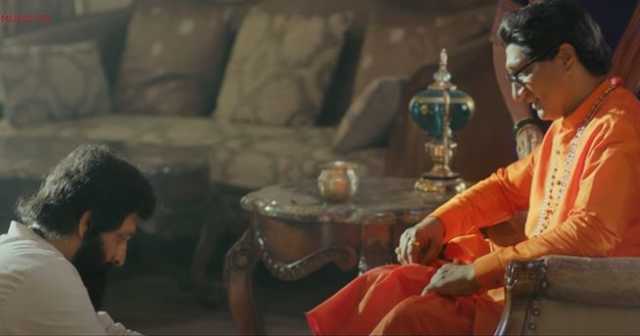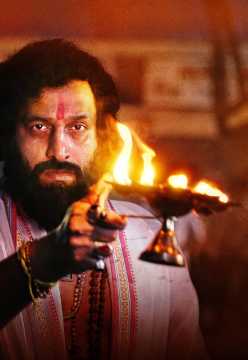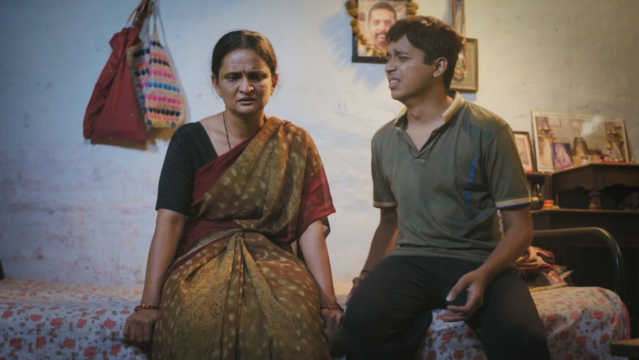
Keyur Seta
Mumbai, 13 May 2022 18:33 IST
The film, written and directed by Pravin Tarde, has an interesting second half and a thrilling climax.

Actor Pravin Tarde made his debut as a director with a devotional film, Deool Band (2015), and followed it up with the underworld drama Mulshi Pattern (2018). His latest release, Dharmaveer (2022), is the biopic of a political figure from Maharashtra, the late Anand Dighe.
While Tarde made a mark with each of his first two films, Dharmaveer is easily his most impactful movie till date. It is also a biopic that would make one take notice irrespective of one's political beliefs.
Dharmaveer begins in Thane, near Mumbai, in the late 1960s when Anand Dighe (whose grown-up version is played by Prasad Oak) is a teenager impressed with the workings of the newly founded Shiv Sena. He becomes a member of the party and gains instant acceptance from his seniors. Pleased with his dedication, MD Joshi (Vijay Nikam) hands over his position as Thane district chief of the Sena to Dighe.
Dighe’s popularity grows over time and he becomes a trusted aide of party founder Bal Thackeray (Makarand Padhye). He becomes the voice of the common Thane resident and takes up various issues citizens face even if it means going against the law. He also establishes a durbar (court) where he resolves disputes in his own way.

Dighe runs into a major hurdle when he is accused of the murder of a party colleague who breaks ranks and votes for the rival Congress candidate in the Thane mayoral election. He is arrested under the draconian Terrorist and Disruptive Activities (Prevention) Act. But he manages to overcome the hurdle and continues as the Thane Shiv Sena leader until his death, aged only 50.
Dharmaveer doesn’t make an ideal start. In reality, Dighe was impressed by Thackeray’s speeches which drew him to join the Shiv Sena. This aspect is not there in the film. Also, his rise to power is not established by the storyline and feels sudden. We are also told about his durbars through dialogues instead of witnessing one.
But the idea of narrating Dighe's story in flashback mode is a good one. The tale is narrated by an autorickshaw driver (Gashmeer Mahajani) to a television journalist (Shruti Marathe) covering a Dighe death anniversary event. Of course, it is hard to believe that the journalist knows nothing about Dighe and was still assigned the task of covering the event. Her ignorance is justified with the explanation that there is not much information about Dighe on Google apart from the fact that he died at the now defunct Sunitadevi Singhania Hospital (which was then ransacked by his supporters), but that explanation is far from the truth.
Dharmaveer, however, gets better as the film progresses and reaches the intermission at an exciting point. The second half is not only much better but also covers up some of the deficiencies of the first half. Dighe’s durbar gets proper portrayal and we also see more of his working style and his inner feelings. In other words, the protagonist truly emerges after the interval.
Prasad Oak deserves a large chunk of the credit for the way the film has turned out, along with Tarde’s writing and style of presentation, of course. He lives and breathes the character of Anand Dighe. From appearing powerful and brutal to being soft-hearted and emotional, he does it all convincingly. There are a few moments where he has to stammer. He is natural even in those portions.

Kshitish Date, as Dighe’s aide and successor Eknath Shinde, puts in a dedicated act. He gets more prominence later. His beard, however, is visibly fake in a few sequences. Snehal Tarde gets noticed through a powerful act. Actors like Vijay Nikam, Gashmeer Mahajani and Abhijeet Khandkekar provide adequate support.
The casting of Makarand Padhye in the important role of Bal Thackeray was questionable. But the choice does not feel so bad after we have witnessed a teenage actor delivering an unintentionally funny act as Raj Thackeray.
Dharmaveer boasts of good music, which is rare in such biopics. The title song as well as ‘Ashtami’ and ‘Gurupurnima’ are numbers that will remain with the viewer long after the film has ended. Avinash-Vishwajeet’s background score is powerful and plays an important part in making the film entertaining. Production designer Nitesh Nandgaonkar has got the bygone era right.
Those who know even a little about Anand Dighe would know that his life had a sad end after he met with an accident and then died of a heart attack in hospital. Yet the episode is presented here in a thrilling and, at times, nailbiting manner.
After Dighe’s death, angry Shiv Sena members had destroyed the Singhania hospital. The makers haven’t tried to water down this episode at all but have gone all out to show the destruction. The hospital, run by the Singhanias of Raymond, was never reopened.
Dighe’s death is considered mysterious by some even after more than 20 years. This is something people are afraid to speak about openly. But Dharmaveer takes up this point and also announces a sequel in the end.
Despite the early negatives, Dharmaveer works mainly due to the gripping second half, the performance of the lead actor, and the exciting finale. It is a no-brainer that the sequel will be keenly awaited.
Dharmaveer was released in theatres across Maharashtra today.
You might also like

Review Marathi
Samaira review: This well-intentioned travel drama suffers from a dull script
Actor Rishi Deshpande's directorial debut doesn't rise as much as its performances. ...

Review Marathi
Goshta Arjunchi review: Triggering conversations about mental health
Anupam Barve’s short film urges people to talk to their families about what they are going...

Review Marathi
Ekda Kaay Zala review: Sumeet Raghvan impresses in a film that does not use its full potential
Directed by Dr Saleel Kulkarni, the film has a fine act by child artiste Arjun Purnapatre....

